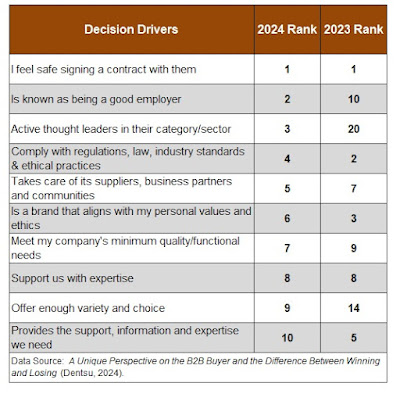(Marketing's role in driving revenue generation and growth at B2B companies has never been more important. However, research continues to show that the influence of most CMOs with their CEO isn't as strong as the importance of marketing suggests it should be. This post describes how CMOs can elevate their standing with the CEO and other senior leaders.)
The Vital Role of Marketing
Today's business decision-makers have easy access to information about almost every conceivable business issue, challenge, and possible solution. As a result, business buyers are increasingly gathering information and researching solutions via interactions with various forms of content, and the design and development of that content falls squarely in the province of marketing.
A 2023 survey by 6sense found that the average B2B buying cycle requires just under 11 months. The survey also found that on average, the first direct contact with sellers occurs at about the 8-month mark. This means about 70% of the average B2B buying process happens before buyers engage directly with vendor sales reps.
Where CMOs Stand With CEOs
Under these circumstances, it would be logical to think that the CMO's influence with the CEO and other C-level executives has increased substantially as marketing has become more essential to revenue growth. However, the research paints a more mixed picture.
It's clear that CEOs view CMOs more favorably now than they did a few years ago. In 2012, The Fournaise Marketing Group released the findings from interviews with more than 1,200 CEOs in North America, Europe, Asia, and Australia.
Eighty percent of the interviewed CEOs said they did not really trust and were not very impressed by the work done by marketers. Sixty-four percent of the CEOs said they had taken product and pricing powers away from CMOs because those factors are too important for business success to let marketers control them.
Just over a decade later, the picture had improved considerably. In The Third Annual CEO Study on Marketing and the CMO conducted by Boathouse in 2023, nearly half (49%) of the surveyed CEOs rated their marketing performance as "Best in Class," up from 24% in the 2022 edition of the survey.
Twenty-six percent of the CEOs in the Boathouse study gave their CMO a grade of "A" on the overall performance of their role. That was up from 16% in the 2022 survey.
However, the 2023 Boathouse survey also identified areas where CEOs weren't as satisfied with CMO performance. For example, only 22% of the surveyed CEOs gave their CMO a grade of "A" on strategy, and the lowest number of "A" grades given to CMOs was on their "ability to drive company growth."
A CMO's ability to influence the CEO ultimately depends on gaining and keeping the CEO's trust. The current evidence suggests that CEOs place a moderate level of trust in their CMO, but trust other C-level executives more.
The 2023 Boathouse survey asked CEOs about the personal trust they placed in members of their leadership team. CMOs were in fourth place (out of eight C-level roles), behind the chief financial officer, chief operating officer, and chief strategy officer.
How CMOs Can Elevate Their Influence
So, what can CMOs do to increase their influence with the CEO? Recent research by Transmission, a global B2B marketing agency (in association with B2B market research firm NewtonX) provides valuable insights on this question, even though the research was focused on a different issue.
The goal of the Transmission study was to identify the attributes CMOs need to exhibit to increase their chances of being selected to serve on a B2B company's board of directors.
The research for the study consisted of interviews with current and former directors (CMOs and non-CMOs) at public and private B2B boards and a survey of 311 B2B CMOs. Based on the interviews, Transmission and NewtonX developed a "Board-Ready CMO Framework" that described eight skills, capabilities, or behavioral traits a CMO must have to be an attractive director candidate.
While this framework focused on the attributes that will help CMOs become "board-ready," several of the attributes can also help CMOs elevate their standing with their CEO.
When it comes to earning greater trust from the CEO, the most important of these attributes is what Transmission and NewtonX called "T-Shaped skills." As the diagram at the top of this post illustrates, a "T-Shaped CMO" is an individual who has deep marketing expertise and a solid working knowledge of "how the business works" overall.
A T-Shaped CMO understands the company's business model, what drives profits in the business, and what levers company leaders can pull to impact financial performance. He or she is knowledgeable about current economic conditions and trends and has a solid understanding of the competitive dynamics of the markets the company serves.
Perhaps most importantly, a T-Shaped CMO can place marketing in the context of the company's overall business strategy and provide sound, evidence-backed advice that will help the CEO and other senior leaders make the trade-offs that are an inevitable part of running a business in a complex, always-changing environment.
In short, a CMO who wants to have greater influence with the CEO and other members of the C-suite needs to demonstrate that he or she is an astute, well-rounded businessperson who also happens to be an outstanding marketer.









